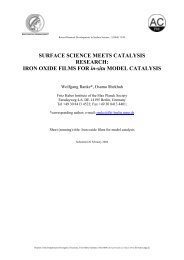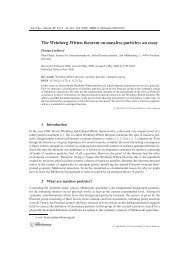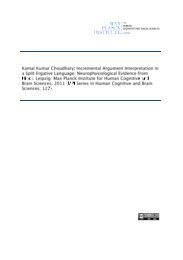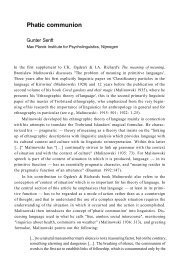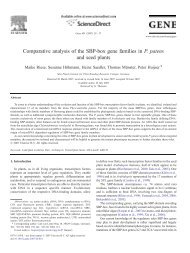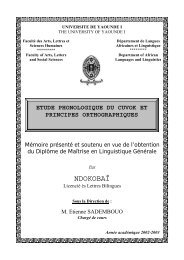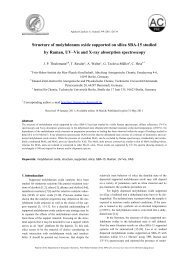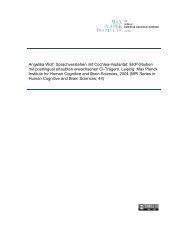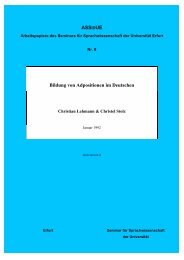Neural Correlates of Processing Syntax in Music and ... - PubMan
Neural Correlates of Processing Syntax in Music and ... - PubMan
Neural Correlates of Processing Syntax in Music and ... - PubMan
You also want an ePaper? Increase the reach of your titles
YUMPU automatically turns print PDFs into web optimized ePapers that Google loves.
5 Language Perception<br />
Language is the prime means <strong>of</strong> communication <strong>in</strong> humans. It may have evolved from<br />
the need for social bond<strong>in</strong>g between <strong>in</strong>dividuals belong<strong>in</strong>g to the same group <strong>and</strong> is<br />
thought to be necessary for the organization <strong>of</strong> human societies. Language has a very<br />
strong semantic component <strong>and</strong> is, thus, a means for expression <strong>of</strong> rational thought <strong>and</strong><br />
for the transmission <strong>of</strong> knowledge as well as it permits projections <strong>in</strong>to the past <strong>and</strong> the<br />
future. Complex syntactic regularities are proposed to be specific to the human language<br />
faculty (Fitch & Hauser, 2004). The process<strong>in</strong>g <strong>of</strong> syntax is central for the present work.<br />
Thus, <strong>in</strong> this chapter special emphasis on its development <strong>and</strong> its process<strong>in</strong>g. The chapter<br />
is organized <strong>in</strong> two ma<strong>in</strong> sections, describ<strong>in</strong>g empirical f<strong>in</strong>d<strong>in</strong>gs related to language<br />
acquisition <strong>and</strong> language process<strong>in</strong>g.<br />
5.1 Language acquisition<br />
Before the development <strong>of</strong> language perception will be outl<strong>in</strong>ed, two theoretical accounts<br />
to language acquisition will be <strong>in</strong>troduced, that ma<strong>in</strong>ly reflect the nature-nurture<br />
debate. Secondly, an overview <strong>of</strong> the development <strong>of</strong> language perception by demonstrat<strong>in</strong>g<br />
when specific ERP components that reflect particular process<strong>in</strong>g stages can be<br />
observed for the first time will be provided. Thirdly, constra<strong>in</strong>ts which are utilized to<br />
acquire l<strong>in</strong>guistic knowledge are described. As the present work is ma<strong>in</strong>ly focused on<br />
syntactic process<strong>in</strong>g, ma<strong>in</strong>ly later stages <strong>of</strong> language acquisition will be focused, that is,<br />
semantics <strong>and</strong> syntax. Semantics will be discussed as it provides the basic build<strong>in</strong>g<br />
blocks to syntax. F<strong>in</strong>ally, there will be a section focus<strong>in</strong>g on the development <strong>of</strong> syntactic<br />
process<strong>in</strong>g <strong>in</strong> children.<br />
Theoretical accounts on language acquisition<br />
In l<strong>in</strong>guistics, two ma<strong>in</strong> classes <strong>of</strong> theories exist to account for language acquisition.<br />
The generative perspective assumes some <strong>in</strong>nate knowledge <strong>of</strong> language structure which<br />
does not change over time (cf. P<strong>in</strong>ker, 1984) <strong>and</strong> proposes “modularized” sub-systems<br />
for different components <strong>of</strong> language. Accord<strong>in</strong>g to Chomsky (1981), speech by adults<br />
is so full <strong>of</strong> hesitations, false-starts, mispronunciations, <strong>and</strong> ungrammaticalities this<br />
could not be an adequate model to abstract complex <strong>and</strong> subtle l<strong>in</strong>guistic regularities. In<br />
addition, Gold (1967) hypothesized that children can not <strong>in</strong>duce grammar <strong>of</strong> certa<strong>in</strong><br />
types from only “positive evidence”. The complexity <strong>of</strong> language <strong>and</strong> the <strong>in</strong>determ<strong>in</strong>acy<br />
<strong>of</strong> <strong>in</strong>put to children (i.e. the “poverty <strong>of</strong> the stimulus”) is taken as further evidence that<br />
grammar cannot be learned (cf. P<strong>in</strong>ker, 1984). However, a considerable amount <strong>of</strong>



